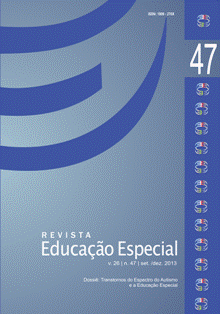Curriculum adaptation and the role of scientific concepts on the development of people with special educational needs
DOI:
https://doi.org/10.5902/1984686X7675Keywords:
Curriculum adaptation, Scientific concepts, Learning.Abstract
This work is based on cultural-historical theory from Vygotsky and on the National Curricular Parameters - Curricular Adaptations (1998) - aiming to discuss the importance of learning scientific concepts (the concepts learned through formal/ academic education) to the development of students with special educational needs. It is characterized as a theoretical essay based on bibliographical research. The discussion axis is the idea of curricular adaptation/flexibility, since there is no real inclusion without considering the individualized education to meet the specific needs of students. The importance attached to school curriculum and scientific concepts referred to it is based on the Vygotskian premise stating that the learning promotes development; according to Vygotsky, knowledge systematization and awareness enter into the child mind through the learning of scientific concepts. Due to the importance of these concepts, it is needed to be careful to think about the curricular adaptations; under the justification of adapting the teaching and curriculum to the specificities of students with special needs. The formal contents are often disregarded, assuming that they would not be within the capacity scope of students, especially those ones with more pronounced difficulties. It is concluded that learning - learning scientific concepts - promotes cognitive development; then, schooling should invest at this point. It is imperative to fight for an inclusive school in which the children, in fact, can learn, learn contents.Downloads
Downloads
Published
How to Cite
Issue
Section
License
Declaration of originality
We declare that all articles present in the journal Revista Educação Especial (UFSM) are originals and were not submitted for publishing on any other publication, as a whole or a fraction. We also declare that, after being published by Revista Educação Especial (UFSM), a paper will not be submitted to another journal within two years. After this time, our journal transfers the publishing rights to the authors, with a permit granted by the Editorial Council.
We also acknowledge that the originals’ submission to Revista Educação Especial (UFSM) implies on a transference of copyright for physical and digital publishing to the journal. In case of noncompliance, the violator will receive sanctions and penalties predicted by the Brazilian Copyright Protection Law (n. 9610, dated 19/02/98).







